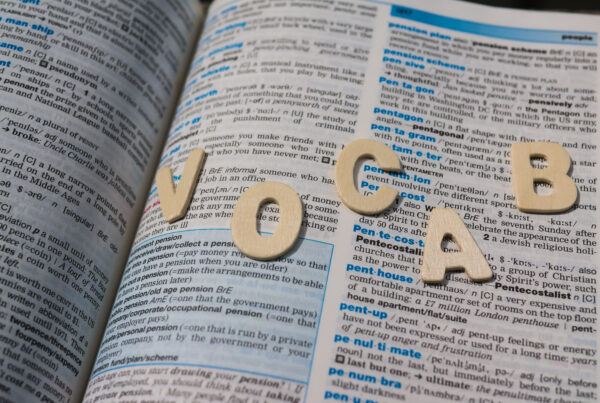A strong vocabulary is a crucial component of success on the GRE, a standardized test that plays a significant role in graduate school admissions. A robust vocabulary not only helps you excel in the verbal reasoning section but also enhances your overall comprehension and communication skills. In this blog post, we’ll explore various strategies and resources to help you improve your vocabulary for the GRE.
Word Lists and Flashcards
Word lists and flashcards are classic tools for building your GRE vocabulary, and we have previously elaborated on the importance of memorization. Creating your own flashcards is a highly effective strategy. Writing down the word, its definition, and using it in a sentence can reinforce your memory and understanding of the term. Anki, Quizlet, and other flashcard apps make this process more manageable. See our post on improving your SAT and ACT vocab for even more resources!
Reading
Reading is one of the most natural and enjoyable ways to expand your vocabulary. Make a habit of reading newspapers, magazines, academic journals, and classic literature. Exposure to various writing styles, genres, and subject matters introduces you to new words and their contextual usage.
Try to read challenging material regularly and maintain a reading journal. Whenever you come across an unfamiliar word, read back through the sentence, act like the word is the blank in a fill-in-the-blank sentence, and make up your own word (or phrase) in its place. Let’s give this a try with my all-time least favorite GRE word:

“Amid the rolling hills and quaint farmhouses, the bucolic scenery of the countryside offered a serene escape from the hustle and bustle of city life, with lush green fields stretching as far as the eye could see.”
Take a second and consciously ask yourself: what word(s) would fit in place of ‘bucolic?’ It doesn’t have to be anything particularly eloquent. Frankly, it doesn’t have to be an actual English word! (See the end of this post for the “words” I’d make up to fill in the blank along with the actual definition.) Then go back and write the word down, research its definition, and use it in your own sentence. This active engagement with language can be highly beneficial for GRE preparation.
Vocabulary Apps
Several mobile apps are designed specifically to improve vocabulary. Apps like Vocabulary.com, and Magoosh GRE Vocabulary Builder offer interactive quizzes, games, and word-of-the-day features. These apps make learning new words engaging and convenient, allowing you to practice on the go.
Thematic Study
Categorizing words based on themes or roots can enhance your understanding and retention of vocabulary. For example, you can group words related to science, philosophy, or art. Alternatively, you can study words with common prefixes, suffixes, or roots. Recognizing these patterns can help you decipher the meaning of unfamiliar words in context.
Contextual Usage
Merely memorizing word definitions is insufficient for GRE success. You must also understand how to use these words appropriately in sentences. Practice writing essays and short stories, incorporating new vocabulary words, or include one GRE word in each email you send. This practical application of words ensures that you can effectively employ them during the GRE’s essay section.
Vocabulary Books
There are numerous GRE-specific vocabulary books available, which offer comprehensive lists of GRE words, practice exercises, and tips on how to remember them. Incorporating these resources into your study plan can be highly beneficial.

Audio Resources
Listening to podcasts, audiobooks, or podcasts can be an effective way to reinforce your word recognition and pronunciation skills. Hearing words used in context can enhance your ability to understand and recall them during the test.
Test Prep Courses
Enrolling in Mindfish’s GRE tutoring program can provide structured vocabulary lessons and practice tests. Our course will assess your strengths and weaknesses, tailor a plan to fit your specific needs, and guide you toward the resources that will best help you maximize your score.

Building a strong vocabulary for the GRE requires a combination of strategies and resources. By combining word lists, flashcards, reading, apps, thematic study, contextual usage, vocabulary books, audio resources, and our test prep course, you can enhance your chances of success on the GRE verbal reasoning section. Remember that consistent practice and a systematic approach are key to mastering your GRE vocabulary. Good luck on your journey to acing the GRE!
Matt’s words in place of ‘bucolic’: wilderness-y, countryside-y, natural (as in undeveloped)
(From Google) bucolic – relating to the pleasant aspects of the countryside and country life.
See? Not altogether impossible! In fact, I use this strategy literally any time I read a word I don’t know the definition of!
Interested in learning more about Test Prep at Mindfish?
Contact us today to find out what our dedicated tutors can help you achieve.





